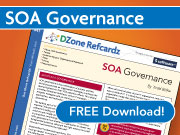 More on review boards…
More on review boards…
In response to my post on the “Effective Governance” talk given at the Gartner EA Summit, Ron Rosenhead said:
For me there are a couple of overlapping issues:
Do project boards actually know what they are established for? Plus, how well trained are members of project boards? I have to say that my experience here in the UK is that Boards are established sometimes with (overly) large numbers, give little guidance and are not well trained in understanding what they are to do and in project management. They usually receive the thumbs down from project managers who say they add little or no value.
Yes, they should set the parameters of decision making and enable others to make decisions. If I was to ask everyone who came through courses we ran in 2008 very few would say that this had actually happened.
His first question is really a great point. All too often, these boards are created without sufficient direction to be effective. If I were on one of these boards, even though it might be boring, I’d really want to just be able to rubber stamp as many of the projects as possible. That can only happen if the board effectively sets expectations in advance so the project teams know what they’re in for. If the project team is forced to guess as to what the board will want, it’s far more likely that they’ll guess incorrectly. At the same time, if the expectations are set, it’s also important for the review board to move through it as quickly as possible. If the team has done their homework, provided the information necessary, don’t waste the project team’s time by walking through the answers for an hour knowing full well that they’ve complied with the policies. This is why I like having explicit policies and think that the use of self asssessments via scorecards can be a very powerful tool.

[…] Biske – More on review boards… All too often, these boards are created without sufficient direction to be effective. If I were […]